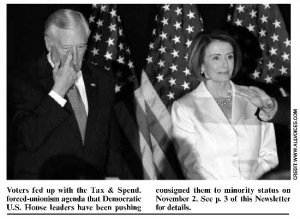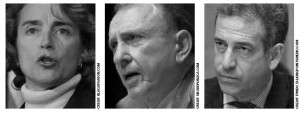Is This Any Way to Run a City’s Schools?
Leaked CTU Proposals Won’t Do Anything to Improve Schools’ Poor Performance

But Big Labor Retains Hold Over U.S. Senate, Key State Assemblies
Not just on November 2, but throughout this past election year, voters across most of the country sent two clear messages to Big Labor politicians on Capitol Hill: They are dismayed by what the politicians have done at union lobbyists’ behest, and determined to stop them from doing more of the same.
One major object of voters’ ire was the controversial “American Recovery and Reinvestment Act” (ARRA), otherwise known as the “stimulus” package. In early 2009, AFL-CIO and Change to Win union lobbyists twisted arms to secure majorities in both chambers of Congress for this $800 billion legislation.
Since it became law, ARRA has bilked taxpayers of hundreds of billions of dollars to ensure that bloated, unionized government payrolls stay bloated, but furnished no detectable net benefit for America’s private sector.
Another key source of voters’ displeasure was ObamaCare.
More even than President Obama or any other elected official, top union bosses and their arm-twisting union lobbyists are responsible for Congress’s narrow votes to reconstruct America’s enormous health-care system in late 2009 and early 2010.
November 2’s exit polls clearly indicate that voters across the country punished vulnerable U.S. representatives and senators for doing what Big Labor told them to do.
Undoubtedly compounding the woes of many of the politicians who had voted for the government union boss-crafted “stimulus” package and ObamaCare was that they were also on the record in support of forced-unionism initiatives that, due to stiff Right to Work opposition, have yet to be enacted.
Millions of freedom-loving citizens were furious with their incumbent politicians for having backed Big Labor’s now-moribund “card check” forced-unionism bill and its so far-stalled scheme to federalize government union monopoly bargaining over state and local public-safety employees.
Big Labor Appeasers in GOP Were First Casualties Of Voter Backlash
While it was overwhelmingly Democrat politicians who paid the price on November 2 for having kowtowed to union bigwigs, the earlier casualties of the voter backlash against President Obama’s forced-unionism agenda were mostly Republicans.
For example, roughly 18 months ago, Republican Arlen Specter (Pa.) decided he had no choice but to abandon his efforts to obtain the 2010 GOP nomination for the U.S. Senate seat he had held for three decades.
Mr. Specter was no doubt correct in calculating that his long record of appeasing Big Labor, including a 2007 vote to shut down a Right to Work filibuster and ram the “card check” scheme through the Senate and an early 2009 vote for government union bosses’ ARRA, had become unpalatable to primary voters.
With the help of the Obama Administration, Mr. Specter tried unsuccessfully to do a quick pivot and capture the Democrat nod for his seat. Finally, on November 2, former GOP Congressman Pat Toomey, who has pledged to support Right to Work 100% on Capitol Hill, became Pennsylvania’s senator-elect by defeating the Big Labor Democrat who had defeated Mr. Specter in his new party’s primary.
The following spring, a second union boss-“friendly” GOP U.S. Senate primary candidate fell so far behind due to his avowed support for ARRA and his shiftiness on other key issues for Right to Work supporters that he dropped out and declared he would run as an independent.
Florida Gov. Charlie Crist’s maneuver to capture his state’s open U.S. Senate seat was no more successful than Mr. Specter’s. On November 2, 100% pro-Right to Work Florida Republican Marco Rubio was elected to the Senate.

Blanche Lincoln and Russ Feingold Ignored Constituents For Too Long
The fact that several establishment incumbent Republicans like Mr. Specter, and establishment favorites for open GOP seats, like Mr. Crist, went down to defeat in congressional primary contests during the 2009-2010 cycle is clear evidence that issues, not party label, drove November’s results.
On Election Day, union-label incumbent Senate Democrats Blanche Lincoln (Ark.) and Russ Feingold (Wisc.) were ousted not because of their partisan affiliation, but because of their voting records. Both had voted for the “card check” bill in 2007, ARRA in 2009, and ObamaCare in 2010. Both also had repeatedly voted to federalize union monopoly bargaining control over public-safety employees.
As their poll numbers plummeted, Ms. Lincoln and Mr. Feingold adopted contrasting strategies.
Ms. Lincoln tried to backpedal from her past votes for the “card check” measure and other employee-coercing, economy-crushing schemes. Mr. Feingold dug in his heels and lectured voters that mandatory “card checks,” ARRA, and ObamaCare are all actually good policy.
Neither strategy worked. Voters weren’t fooled by Ms. Lincoln’s election-year “conversion,” nor were they persuaded by Mr. Feingold’s harangues. Republicans John Boozman and Ron Johnson, both of whom are pledging to support Right to Work consistently, will be the new senators from Arkansas and Wisconsin, respectively.
Despite significant setbacks for Big Labor in U.S. Senate primary and general elections, and despite steep losses for Big Labor in U.S. House and state-level contests (see pp. 3 and 6 of this Newsletter, respectively, for details), the 2009-2010 election news was not all bad for the union bosses.
Union Bosses’ Forced Dues-Fueled Machine Churns Out A Harry Reid Victory
In Washington State and in Colorado, the union political machine, which runs on dues and “agency” fee money extracted from millions of workers as a condition of employment, helped pro-forced unionism incumbent Democrats fend off strong challenges from candidates who vowed to support Right to Work.
But the biggest federal victory for the union brass was the reelection of their pet Senate majority leader, Harry Reid of Nevada. As the head of a 53-member caucus in a 100-member chamber, Mr. Reid will continue to hold the Senate reins in January.
Another positive for the union hierarchy is its retention, despite experiencing very substantial losses in state races overall, of complete control over the legislatures and the governorships in California and Illinois, and possibly (pending recount results) in New York as well.
With the ample executive power of the Obama Administration (see p. 4 for more information), the Senate, and the governments of some of the largest states in the country still at their disposal, the union bosses are already plotting their comeback. Right to Work supporters must also prepare for the coming battles.

Leaked CTU Proposals Won’t Do Anything to Improve Schools’ Poor Performance

Wherever Big Labor wields the power to collect forced union dues, union bosses funnel a large share of the confiscated money into efforts to elect and reelect business-bashing politicians. Employment growth tends to lag as a consequence.

Members Insist They Keep Pro-Right to Work Campaign Promises